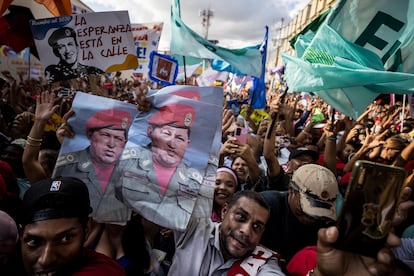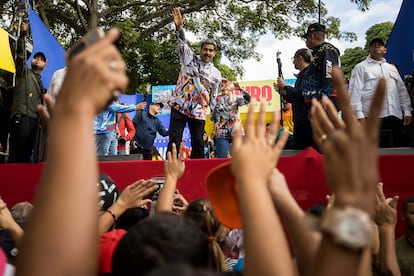Doubts over whether Chavismo will accept election defeat keep Venezuelan opposition in suspense
The Maduro government has sent contradictory messages when referring to a scenario in which Edmundo González Urrutia wins the presidential vote on July 28


No one knows for sure what daybreak will bring in Venezuela on July 29, the day after the presidential elections. The opposition’s consensus candidate, Edmundo González Urrutia, scores higher in the most reliable polls than the current president, Nicolás Maduro. Under normal conditions, the transfer of power between an outgoing and an incoming president would be a mere institutional formality, but in the context in which Venezuela finds itself, it is an unknown quantity. Opponents see a clear opportunity for change in the country after 25 years of Chavismo and consider their victory almost certain. At the same time, they wonder if the Bolivarian revolution, which now controls all the levers of the state, will accept a defeat and allow someone other than Maduro through the door of the Miraflores Palace, the seat of government, in January next year.
Urrutia has inherited almost all the political capital of María Corina Machado, the opposition leader electorally vetoed by the government. Machado is touring the country during the opposition’s campaign promoting the name of Urrutia, who until recently was an unknown diplomat who had spent his whole life moving in the backrooms of power. Urrutia has stated repeatedly that he will carry out an orderly, calm transition, without trauma or vindictiveness. In the opposition, the idea that it is necessary to facilitate an exit route for Chavismo is gaining traction. The government is concerned that once it relinquishes power, the door will open for investigations into the quarter of a century it has held the reins of the country. Maduro himself is the subject of a $15 million reward offered by the DEA.
Presidents of other countries in the region such as Colombia’s Gustavo Petro or Brazil’s Lula Da Silva have promoted — so far without success — the signing of a political agreement that would set the guidelines for the days following the vote. In the Barbados agreements, signed at the end of 2023, the will to respect the electoral result was put in writing. However, there are many voices demanding that in the 11 remaining days before the poll, Urrutia and Maduro sit down at the same table and sign a commitment to honor the results. In reality, all these efforts are focused on only one thing: that Chavismo, if it is voted out, accepts the defeat and facilitates a transition.
Maduro and his entourage have issued contradictory signals. The president has insisted on the campaign trail that he represents “peace,” as if in Venezuela there were a conflict with armed factions as in the case of Colombia. In a speech addressed to police officers Tuesday, Maduro stated: “The ultra-right in their desperation, because they are lost [...] want to look for a tragedy, a hecatomb.” In a video published days ago, at the border, Maduro said he is prepared to prevent “an invasion,” without specifying who would lead the assault. Although Chavismo is in control of the police, the military and the intelligence services, it has steeped itself in the narrative that it is facing destabilizing superior powers. The vice-president of the ruling United Socialist Party of Venezuela (PSUV), Diosdado Cabello, said on Tuesday at an event: “Enough of hatred, gentlemen of the extreme right; enough of political stupidity, Venezuela wants to live in peace.” Cabello has for years presented a television program called Con el mazo dando, in which he lashes opponents with harsh rhetoric and attacks anyone who offers an opinion about Venezuela, such as Colombian Foreign Minister Luis Gilberto Murillo, who has said he hopes for fair and free elections to take place.

Weeks ago, Minister of Defense Vladimir Padrino stated that the revolution will continue “no matter what happens.” However, Freddy Bernal, governor of the state of Táchira, gave an interview to the media Primera Página in which he made an observation that has surprised many observers: “Every time we have lost, we have handed over. In the wrong assumption that we will lose - which is not going to happen - do not have the slightest doubt about the democratic disposition of President Nicolás Maduro and of us.” These words, spoken by one of the politicians closest to Maduro, spread like wildfire in WhatsApp messages. They were interpreted as a door for Chavismo to accept a possible defeat at the polls. “If the victory of Edmundo González [Urrutia] is declared, it is because [the ruling party] decided to leave power. Then you are left with all the rest of the institutions in your hands and six months for negotiations with the executive,” explains Felix Seijas, from the polling firm Delphos.
For Seijas, it is evident that Maduro does not want to relinquish power. “But if Edmundo’s victory is announced, it means that he had no other lower-cost alternative,” he adds. On the other hand, Antonio Ecarri, an opposition presidential candidate who has not joined forces with Urrutia, believes that Chavismo is ready to vacate the presidency. In fact, he believes that the debate lies elsewhere: “The problem is governance. The best favor that can be done for Maduro is for a weak government to succeed him. Venezuela must be open to state pacts.” That current of opinion is gaining strength as the election approaches: according to this assumption, parties from across the political spectrum must govern together, and even include some sectors of Chavismo.
For Elias Pino, historian and former director of the National Academy of History of Venezuela, the situation has taken the government leadership by surprise: “The regime has been overtaken by events. It did not expect such a massive and forceful response from society, in the face of which it still has not offered signs of an emphatic movement. It attacks specific situations as they develop, without showing any disposition to put an end to the process once and for all. They were too late to react, and that will now prove costly.” Without explicitly verbalizing it, Pino is referring to the suspension of the elections, a possibility that remains in the air even at this stage. In the past, Maduro has said that there would be no free elections if “Venezuela was not free of sanctions.”
Time is running out. Political scientist John Magdaleno highlights that the ruling party finds itself in an extreme situation - the real possibility of losing at the polls - and that it seems to have little room for maneuver. “Especially if the result suggests a gap of more than 10 percentage points in favor of the opposition. The most recent and credible polls are placing the voting intention gap between 25 and 27 percentage points of advantage for Urrutia. But political actors do not always behave “rationally,” if we understand by such a term the adequacy of means to ends. We will see what happens,” he concludes.
Sign up for our weekly newsletter to get more English-language news coverage from EL PAÍS USA Edition
Tu suscripción se está usando en otro dispositivo
¿Quieres añadir otro usuario a tu suscripción?
Si continúas leyendo en este dispositivo, no se podrá leer en el otro.
FlechaTu suscripción se está usando en otro dispositivo y solo puedes acceder a EL PAÍS desde un dispositivo a la vez.
Si quieres compartir tu cuenta, cambia tu suscripción a la modalidad Premium, así podrás añadir otro usuario. Cada uno accederá con su propia cuenta de email, lo que os permitirá personalizar vuestra experiencia en EL PAÍS.
¿Tienes una suscripción de empresa? Accede aquí para contratar más cuentas.
En el caso de no saber quién está usando tu cuenta, te recomendamos cambiar tu contraseña aquí.
Si decides continuar compartiendo tu cuenta, este mensaje se mostrará en tu dispositivo y en el de la otra persona que está usando tu cuenta de forma indefinida, afectando a tu experiencia de lectura. Puedes consultar aquí los términos y condiciones de la suscripción digital.








































